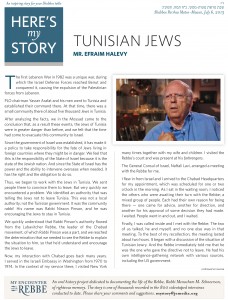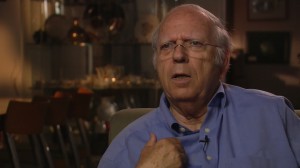3 July 2013
The first Lebanon War in 1982 was a unique war, during which the Israel Defense Forces reached Beirut and conquered it, causing the expulsion of the Palestinian forces from Lebanon.
PLO chairman Yasser Arafat and his men went to Tunisia and established their command there. At that time, there was a small community there of about five thousand Jews in Tunisia.
After analyzing the facts, we in the Mossad came to the conclusion that, as a result these events, the Jews of Tunisia were in greater danger than before, and we felt that the time had come to evacuate this community to Israel.
Since the government of Israel was established, it has made it a policy to take responsibility for the fate of Jews living in foreign countries where they might be in danger. We feel that this is the responsibility of the State of Israel because it is the state of the Jewish nation. And since the State of Israel has the power and the ability to intervene overseas when needed, it has the right and the obligation to do so.
Thus, we began to work with the Jews in Tunisia. We sent people there to convince them to leave. But very quickly we encountered a problem. We identified an authority that was telling the Jews not to leave Tunisia. This was not a local authority; not the Tunisian government. It was the community rabbi! His name was Rabbi Nisson Pinson, and he was encouraging the Jews to stay in Tunisia.We quickly understood that Rabbi Pinson’s authority flowed from the Lubavitcher Rebbe, the leader of the Chabad movement, of which Rabbi Pinson was a part, and we reached the determination that we needed to see the Rebbe to explain the situation to him, so that he’d understand and encourage the Jews to leave.
Now, my interaction with Chabad goes back many years. I served in the Israeli Embassy in Washington from 1970 to 1974. In the context of my service there, I visited New York many times together with my wife and children. I visited the Rebbe’s court and was present at his farbrengens.
The General Consul of Israel, Naftali Lavi, arranged a meeting with the Rebbe for me.
I flew in from Israel and I arrived to the Chabad Headquarters for my appointment, which was scheduled for one or two o’clock in the morning. As I sat in the waiting room, I noticed the others who were awaiting their turn with the Rebbe; a mixed group of people. Each had their own reason for being there – one came for advice, another for direction, and another for his approval of some decision they had made. I waited. People went in and out, and I waited.
Finally, I was called inside and I met with the Rebbe. The two of us talked, he and myself, and no one else was in that meeting. To the best of my recollection, the meeting lasted about two hours. It began with a discussion of the situation of Tunisian Jewry. And the Rebbe immediately told me that he was the one who gave the directive not to leave. He had his own intelligence-gathering network with various sources, including the US government.
He had checked his information and had come to the conclusion that there was no special danger to the Jews of Tunisia, so he had directed them not to leave. He said, “I believe we must sustain, to the extent possible,
every Jewish community around the world. I recognize the role of the State of Israel – I personally support Aliyah, and I’ve instructed certain families to make Aliyah, but we mustn’t just eliminate a Jewish community.”
I explained to the Rebbe why we in Israel saw the situation differently. But, in the end, we remained with our different opinions – he was convinced that the Jews were in no special danger, and I that they were.
In our conversation it was apparent that he had a tremendous knowledge in the area of intelligence and intelligence gathering. And his connections were vast. He had connections with the White House and the State Department. He had connections in other places in the world with the powers that be. It was obvious that here was a man of the larger world, not of a small chasidic court.
He was also a man with a vision – a big vision – and he did not abandon that vision even for a moment. And his vision was expressed not only in theory, but also in action – sending his emissaries all over the world to serve the Jewish nation.
There is no doubt that in many places in the world, Chabad emissaries play a very important role in the continued existence of the Jewish people, and in the continued existed of the Jewish nation as a whole. When I served as Israel’s ambassador to the European Union in Brussels, I met the emissaries of Chabad who worked there. And I also met those in Riga and in Sydney. And I believe that if Chabad did not exist, the situation of the continuity of the Jewish nation would be much worse. This tremendous contribution that Chabad is making – no other movement in the world gives such a contribution to our people. And in my eyes this is a great blessing.
Efraim Halevy served as the director of the Mossad, Israel’s national intelligence agency. He was interviewed at his home in August, 2009.
This week’s Here’s My Story is dedicated
in honor of our dear Rebbe
by
The Jacobs Family
The first Lebanon War in 1982 was a unique war, during which the Israel Defense Forces reached Beirut and conquered it, causing the expulsion of the Palestinian forces from Lebanon.
PLO chairman Yasser Arafat and his men went to Tunisia and established their command there. At that time, there was a small community there of about five thousand Jews in Tunisia.
After analyzing the facts, we in the Mossad came to the conclusion that, as a result these events, the Jews of Tunisia were in greater danger than before, and we felt that the time had come to evacuate this community to Israel.
Since the government of Israel was established, it has made it a policy to take responsibility for the fate of Jews living in foreign countries where they might be in danger. We feel that this is the responsibility of the State of Israel because it is the state of the Jewish nation. And since the State of Israel has the power and the ability to intervene overseas when needed, it has the right and the obligation to do so.
Thus, we began to work with the Jews in Tunisia. We sent people there to convince them to leave. But very quickly we encountered a problem. We identified an authority that was telling the Jews not to leave Tunisia. This was not a local authority; not the Tunisian government. It was the community rabbi! His name was Rabbi Nisson Pinson, and he was encouraging the Jews to stay in Tunisia.We quickly understood that Rabbi Pinson’s authority flowed from the Lubavitcher Rebbe, the leader of the Chabad movement, of which Rabbi Pinson was a part, and we reached the determination that we needed to see the Rebbe to explain the situation to him, so that he’d understand and encourage the Jews to leave.
Now, my interaction with Chabad goes back many years. I served in the Israeli Embassy in Washington from 1970 to 1974. In the context of my service there, I visited New York many times together with my wife and children. I visited the Rebbe’s court and was present at his farbrengens.
The General Consul of Israel, Naftali Lavi, arranged a meeting with the Rebbe for me.
I flew in from Israel and I arrived to the Chabad Headquarters for my appointment, which was scheduled for one or two o’clock in the morning. As I sat in the waiting room, I noticed the others who were awaiting their turn with the Rebbe; a mixed group of people. Each had their own reason for being there – one came for advice, another for direction, and another for his approval of some decision they had made. I waited. People went in and out, and I waited.
Finally, I was called inside and I met with the Rebbe. The two of us talked, he and myself, and no one else was in that meeting. To the best of my recollection, the meeting lasted about two hours. It began with a discussion of the situation of Tunisian Jewry. And the Rebbe immediately told me that he was the one who gave the directive not to leave. He had his own intelligence-gathering network with various sources, including the US government.
He had checked his information and had come to the conclusion that there was no special danger to the Jews of Tunisia, so he had directed them not to leave. He said, “I believe we must sustain, to the extent possible,
every Jewish community around the world. I recognize the role of the State of Israel – I personally support Aliyah, and I’ve instructed certain families to make Aliyah, but we mustn’t just eliminate a Jewish community.”
I explained to the Rebbe why we in Israel saw the situation differently. But, in the end, we remained with our different opinions – he was convinced that the Jews were in no special danger, and I that they were.
In our conversation it was apparent that he had a tremendous knowledge in the area of intelligence and intelligence gathering. And his connections were vast. He had connections with the White House and the State Department. He had connections in other places in the world with the powers that be. It was obvious that here was a man of the larger world, not of a small chasidic court.
He was also a man with a vision – a big vision – and he did not abandon that vision even for a moment. And his vision was expressed not only in theory, but also in action – sending his emissaries all over the world to serve the Jewish nation.
There is no doubt that in many places in the world, Chabad emissaries play a very important role in the continued existence of the Jewish people, and in the continued existed of the Jewish nation as a whole. When I served as Israel’s ambassador to the European Union in Brussels, I met the emissaries of Chabad who worked there. And I also met those in Riga and in Sydney. And I believe that if Chabad did not exist, the situation of the continuity of the Jewish nation would be much worse. This tremendous contribution that Chabad is making – no other movement in the world gives such a contribution to our people. And in my eyes this is a great blessing.
Efraim Halevy served as the director of the Mossad, Israel’s national intelligence agency. He was interviewed at his home in August, 2009.
This week’s Here’s My Story is dedicated
in honor of our dear Rebbe
by
The Jacobs Family







No Comments to “”